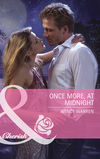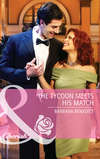Buch lesen: «Secrets Of The Outback»
“Deception runs through everything.”
Jewel’s expression was bleak as she looked at her aunt. “I don’t think I can bear this, Judith. I had an identity. Who am I now? I don’t even think I want to continue with the law firm. They represent Copeland Connellan. From the way Keefe Connellan spoke, he wants me out.”
“Does he, now? How could he blame you for anything?” Judith demanded hotly. “You had no control over your own birth.”
“Hard to argue with that, but he seems to think I’m manipulating the present situation.” She managed a discordant laugh. “And it’s all based on assumptions—on jumping to conclusions.”
“He may have discovered the truth, Jewel—a truth that’s as new to me as it is to you. But it all adds up. Travis Copeland used to visit the station on behalf of his father. Your mother was a very pretty girl.” Judith shook her head. “And she always did have a talent for keeping secrets.”
Dear Reader,
At some time we all have to grapple with the difficulties of family—as well as drawing strength and pleasure from its great joys. This story is about how one young woman tries to deal with her life when she discovers, at the age of twenty-five, that her true parentage has been kept secret from her. A monumental discovery and one that creates many new problems, invading every aspect of life. Think how those problems would be compounded if the “new” family considers itself under threat. Human beings aren’t always understanding and tolerant, let alone ready to accept an “outsider” without suspicion. The best one can do is find the courage to reach out, find a way to link the past with the present.
I hope you enjoy Jewel’s story. I enjoyed writing it. It has been a great pleasure and an exciting challenge for me to join the ranks of Harlequin Superromance. As always, I want to convey to my “new” audience my great love for my unique homeland, Australia. Who knows, it might lure you to come Down Under!
Margaret Way
Secrets of the Outback
Margaret Way

MILLS & BOON
Before you start reading, why not sign up?
Thank you for downloading this Mills & Boon book. If you want to hear about exclusive discounts, special offers and competitions, sign up to our email newsletter today!
Or simply visit
Mills & Boon emails are completely free to receive and you can unsubscribe at any time via the link in any email we send you.
This book is dedicated to Diana Palmer,
who once told me, “If I can do it, so can you!”
Thanks, Diana.
CONTENTS
PROLOGUE
CHAPTER ONE
CHAPTER TWO
CHAPTER THREE
CHAPTER FOUR
CHAPTER FIVE
CHAPTER SIX
CHAPTER SEVEN
CHAPTER EIGHT
CHAPTER NINE
CHAPTER TEN
CHAPTER ELEVEN
CHAPTER TWELVE
EPILOGUE
PROLOGUE
February, 1981
STEVE BISHOP, overseer of a remote Outback cattle station, sat in one of the back pews of the Anglican cathedral in the Queensland State capital, thinking he’d never had an experience like this. In fact, it had to be the most extraordinary occasion he had attended in his thirty-one years. Living the way he did in the vast, sparsely populated Outback, he was in awe of the crowd. Used to counting head of cattle, he estimated there had to be at least three thousand people packed into the church, all sitting bolt upright in the crush. Outside on the street, mourners who couldn’t make it through the door stood twenty deep, prepared to smile if a camera came near. Inner-city traffic had ground to a halt. So had business.
Today was the funeral of one of the most powerful and influential men in the nation: Sir Julius Copeland, mining magnate, land baron, executive chairman of the giant mining firm Copeland Connellan Carpentaria. Self-confessed Titan.
Important as Sir Julius had been, Steve had had no idea the funeral would be so huge. Or so glittering. Most people, himself included—and it had set him back—had suited themselves in funeral black. But the women treated their somber gear as some sort of blessing in disguise. They wore jewelry. None of your costume jewelry stuff. Lots of extravagant yellow gold. Ropes of pearls and diamond brooches that sparkled brilliantly as they caught the light. He had the notion that just one of those brooches could feed an Outback family for a year. The hats were spectacular, too. Fit for the Melbourne Cup.
The cathedral with its miles of red carpet was redolent with not only the vaguely sickening scent of flowers, great banks of them, but the smell of money. Big money. Power. The milieu in which Sir Julius had lived and become a monolith of industry.
As expected, the dignitaries sat up front, striving to look lofty—the governor of the state, along with the roly-poly premier who was working hard to suppress his usual big vote-winning smile. The dour leader of the Opposition sat a pew behind, holding a snowy white handkerchief to his face as though he had a nose-bleed or was grieving for the deceased. Steve recognized the federal senator sent to represent the prime minister. This was the same guy he and his cattleman friends had shouted down when the senator last came Outback to deliver more empty promises. Behind them sat the representatives of the legal and business communities, their expressions masked. Then there were the cattle barons, land owners and lesser mortals, all of whom had braved the scorching heat—heck, it was hotter in the capital than in his desert home!—to pay their respects to a giant among men. At least, that was how the press had described Sir Julius in his obituary.
Steve had read it that morning with a sense of mounting wonder and irony. Sir Julius had been all sorts of things, but no one in his right mind could’ve called him a nice guy. Julius Copeland had been an ogre. Six foot four, built like an armored tank. Voice like the rumble of thunder. Pale ice-blue eyes sharp enough to drill holes in cement. He might have been larger than life, cleverer, more determined, more ruthless than most, but he hadn’t been liked, let alone revered. Maybe loathed would describe it. Steve had been surprised by his boss’s sudden death of a massive heart attack, but he honestly couldn’t say he felt any sorrow. With no provocation, Julius Copeland had made life difficult for many, many people, including him.
Now it was time for Sir Julius to meet up with his own Boss. Yet as villains went, Steve supposed Copeland had to be a long way down the list. After all, there was Hitler, Stalin, Nero, Genghis Khan…
Across the aisle, in the front pew, sat the widow, Lady Davina Copeland, a woman much respected for her dedication to public affairs. Fighting for equality for minority groups, that kind of thing. One could say she had set herself in direct conflict with her husband. God knows why she’d ever married the man. They couldn’t have hit it off. Steve could only glimpse her from the back. She looked like a woman half her age. Of course, he’d seen grainy photographs of her in the newspapers over the years, but he’d never seen her in the flesh. She was supposed to be beautiful. Very glamorous. He was determined to get a good look at her before he went home. Her godawful son Travis sat beside her. Tall, dark, saturnine, a real personage in his own opinion. Some women might find him attractive, Steve reasoned, rubbing his chin, but Travis Copeland had always made him feel downright queasy. Though Travis always acted like a power to be reckoned with, he was in no way competent to step into his father’s shoes. He wasn’t a total dolt, either, Steve supposed. The business community would’ve figured that out. Travis’s upper-crust wife sat beside him, spine straight, allowing his body to touch hers at the shoulder. She was good-looking, sure, but skinny enough to make a man weep. It couldn’t be all sunshine for Travis. Steve had heard, too, that the wife was a bit of an ogress. Must’ve rubbed off from her father-in-law. Steve knew they had a child, Amelia, a few years older than his own little darling. Amelia wasn’t in attendance. Probably she’d been judged to be too young. Funerals weren’t very pleasant at the best of times, but especially if you were a friend of the family. Now, little Amelia’s grandfather, the man who’d been so very important to the state and to so many lives, would shortly be laid to rest.
If they ever got through the eulogies, Steve thought, loosening his tie. Too many. Too long. Some of them had to be tongue-in-cheek. Especially the archbishop’s. He had to have some knowledge of Copeland’s true nature. The Sir Julius that Steve knew, his boss, owner of Mingaree Station, and a string of other pastoral properties adding up to some five million hectares, was a bastard in anyone’s language, and you’d better believe it.
Forgive me, Lord. Steve momentarily bent his head, ashamed of his irreverence. Not that the good Lord wouldn’t agree after He’d talked to the man, however briefly. Julius Copeland had been intimidating beyond belief, so rough of tongue he made the crudest station hand blush. A complete contrast to his partner of the old days, Sir Stafford Connellan. Steve had had the greatest respect for Sir Stafford, knighted, like Copeland for service to his country. The big difference was that Sir Stafford had been a great man, a bred-in-the-bone gentleman. A real thoroughbred, now sadly deceased. Sir Stafford’s son, Earle, had succeeded his father in the firm. Steve could just see where Earle Connellan sat, his lean handsome face solemn, with his dark-haired wife, Rebecca and their only child, a son of around thirteen, Keefe. The boy was the image of his father which was to say strikingly handsome, but there was more to it. Like his father and grandfather before him, he had that aura of integrity and high intelligence. That special look of breeding. Industrial giant though he’d been, Sir Julius had never had that. No doubt, in time the boy Keefe would become a force in the firm. The Connellans were still major shareholders, despite Sir Julius’s best efforts to outwit them after Sir Stafford’s death. No sense of decency there.
The Connellans, too, were possessed of great wealth, but they’d always had virtually the opposite approach to it. Earle Connellan stood head and shoulders above the likes of Travis, whom Steve detested for a number of reasons. Earle was a great guy, a man you could talk with, no side to him for all his privileged background. Travis, though, was an arrogant son of a bitch. Pretty much thought himself a god. As did his old man. Not that Steve and Thea had to suffer Travis much these days. At one time, Travis had flown into the station regularly in his Beech Baron, but not for ages now. Come to that, Steve hadn’t visited the city in years. Today he was part of a contingent of cattlemen who’d traveled a thousand miles and more to attend the great man’s funeral. Damn near mandatory. It was easy to tell who the cattlemen were. Though suitably dark-suited, all of them to a man balanced their trademark akubras on their knees. As did Steve. He’d nodded to most of them as they made their bowlegged way in. Horsemen. And it showed.
Landowners were up front, as befitting the guys who owned the whole caboodle. Employees were at the back. Steve didn’t mind. He wasn’t part of this world of wealth and privilege. He didn’t want to be. Steve considered himself blessed. He had a job he enjoyed. Plenty of back-breaking work, of course, but he was well-paid and he had security of tenure if only because he knew his job and had a good business head. He had the sweetest wife, too, his loyal Thea. She had given him such happiness since the moment he put his ring on her pretty finger. Above all, he had Jewel. God, he adored that child! She was his life. Six going on seven. The most adorable, the spunkiest, smartest, most affectionate daughter a father could want. Hair of spun gold. In total contrast, her delicate winged eyebrows were many shades darker than her hair, almost black. She had blue eyes of such radiance that he had bypassed the name she’d been christened, Eugenia after Thea’s mother, to settle on the only name possible when one looked into those sparkling eyes—Jewel. Jewel Bishop. Nowadays no one on the station called her anything else. His little Jewel. His sweetheart. His treasure. He couldn’t wait to get back to his “girls.” He already knew what he was going to bring them as gifts. Every trip away, even a trip like this, Steve bought his girls surprises. He loved the moment they opened them, the way their eyes lit up with love for him. His girls. His life.
The service droned on to the point that he actually considered getting up and stretching his legs. About time things got moving. He couldn’t bear being trussed up in this city gear. And the heat! Some guy choked up and had to be led off. Must’ve been an act. Still, this was no place for such an unChristian thought, Steve decided. He lowered his curly dark head to his hymn book, joining a choir of uniformed kids from one of the posh schools. Probably Sir Julius’s alma mater. He tried to visualize Julius Copeland as a small boy. Couldn’t. He’d always figured Sir Julius had sprung into this world fully grown—and had believed the old boy could never die. Now Sir Julius’s final destination was waiting. Steve didn’t know exactly where that would be, but he wouldn’t be a bit surprised if Sir Julius was going straight to hell.
TEN MINUTES LATER, Steve got his first good view of Lady Copeland as she made her dignified way down the aisle. No one to support her. She probably felt as though a great weight had been lifted from her shoulders. She didn’t look from side to side. She didn’t look at anyone. Steve had to keep reminding himself of her age. She was Travis’s mother, which had to put her well into her fifties, but behind the short black veil she wore over her face—he thought only royalty did that—she looked as youthful as her daughter-in-law.
Steve found the opportunity to study her again outside. He was tempted to go up and say hello to her. Explain he was overseer of one of the Copeland cattle stations. Of course he didn’t. He hung around watching the VIPs go, instead. Her elegant beringed hand came up to push back the short veil. Now, for the first time, Steve saw her face exposed to the brilliant sunlight.
Lord God! He gulped as a terrible malevolent humming started up in his head. The clarity of shock and the pain almost felled him. In one soul-destroying moment of revelation, Steve knew his whole life had been stolen from him. He reeled with the impact. Slammed into something hard. A stone pillar. He knew beyond any doubt that he could never be happy again.
The face of this woman, Davina Copeland, was the same magical face as his own daughter’s. The resemblance was startling. Here was the mould for the face of the child who had given him all the joy in the world. His daughter, Jewel. There was the hair, dressed differently, of course—maybe the woman’s owed a little these days to artifice—but it was the same thick, gleaming gold. There were the distinctive winged black brows, the heavily fringed blue eyes that shone like jewels.
Now all those hazy questions he’d sealed away in his mind broke out of the vault. He turned in blind anguish, his feelings of betrayal so powerful that they were beyond words. He looked for and found Travis Copeland. The destroyer was standing by himself. Without hesitation Steve moved in. He would have liked to shout “Adulterer!” but his throat closed up. Travis was sweating and shaking, just standing there staring at him. Knowing what was coming.
Before anyone could stop him, Steve Bishop, superbly fit, launched himself at the man who had dishonored his wife, ruined his life. He grabbed him powerfully by the shoulder, then—as mourners turned, both aghast and agog—punched Travis so hard in the face that he was knocked clear off his feet. Copeland’s patrician nose was most assuredly broken. Steve had felt the crunch, but without any satisfaction.
A woman in a chic black suit began to wail. Not the widow. Not the wife. Perhaps they realized this sort of display was bound to happen sooner or later. While Travis Copeland sprawled on the stone steps, his nose gushing blood, police descended on Steve Bishop. They overpowered him swiftly although he offered no resistance. He rocked back and forth on his feet, his face ashen, not a shadow of regret in his eyes. Steve Bishop was in an altered state from which he would never give himself time to recover.
It was impossible to hide things. In the end they always came out.
CHAPTER ONE
The present
MONDAY MORNING. Traffic was heavier than normal. Jewel swung a U-turn, not exactly sure if it was legal, and took a different route, only to find some of the lights were out on Station Road, which put her farther behind. Another couple of delays would precipitate a minor crisis. She would be late for her Monday morning “chat”—a quaint tradition—with her boss, Blair Skinner, a man she found extremely abrasive. Few in the prestigious law firm of Barton Skinner Beaumont didn’t, but they all wanted to hang on to a career. Instead they made jokes about him behind his back.
A vacant parking space in the small basement of her office building almost caught her unaware. She drove into it nearly dizzy with relief. The only real way to secure basement parking was to arrive early. Which she always did. Except today…. Someone, bless him or her, had obviously called in sick.
Jewel grabbed her handbag, so expensive she really should insure it, then locked her car by remote. She made directly for the lifts, feeling reassured, despite her workouts at the gym, that there were a few fellow workers about. Must’ve been stalled by the same set of lights. A few weeks back, another young woman who worked in the building had had a bad scare when a man approached her, pulling a gun from an inside pocket. As it later turned out after a comparatively easy citizen’s arrest—the young woman’s rescuer was a prominent footballer—the gun was a fake and the man had a long history of psychiatric problems. Still, no one needed an experience like that. There really should be security, she thought for perhaps the hundredth time, knowing full well it wasn’t going to happen.
In the handsomely appointed ladies’ rest room—thank God Barton Skinner Beaumont hadn’t gone unisex like they did on Ally McBeal—Jewel checked herself in the mirror. Skinner demanded that the three female associates of the prestigious law firm that bore his name—well, his grandfather’s—be groomed to perfection. Impeccable himself in all matters of dress, manners and taste, Skinner was very severe about it. Up until recently, Barton Skinner Beaumont hadn’t even allowed bright young women through their hallowed portals. All vacancies had been filled by bright young men. But Jewel, who held firmly to the belief that women could achieve anything, had become a prime target for Skinner’s “wit.” Not that the male associates were entirely spared. They, too, received a fair sprinkling of Skinner’s sarcastic comments without a one of them game enough to tell him to mind his own business. Extraordinarily enough, Jewel had. That was what came of being born in the bush.
Skinner wasn’t going to catch her out today, even if he tried an average of three times a week. Today she’d dressed in a brand-new suit, which had substantially set her back, fine-quality midnight-blue wool, austere but beautifully cut. Under it, to add flair, she wore a brilliant silk blouse, turquoise striped with fuchsia, matched exactly by her lipstick. Incredibly, Skinner noticed things like that. The turquoise intensified the blue of her eyes. She’d had her hair cut recently to just past chin length. It fell thick and heavy in a side-parted classic pageboy. She used to wear it much longer, the way the ex–man in her life liked it, but this was a fresh start. Why did women always cut their hair on such occasions? Perhaps she could find out with a few sessions on a psychiatrist’s couch. Not that she trusted psychiatrists. Not after the way they’d sorted out her mother’s problems—from depression to grand psychosis.
Just thinking about it was an agony, even though it had been going on for years and years. Determinedly Jewel redirected her attention to the mirror. With her suit she wore good daytime jewelry. Nothing tacky. So what if she could only afford 9-carat gold? It was tasteful, understated. Anyone might think she’d been hired as a clotheshorse instead of a pretty good corporate lawyer, she thought with a grin. No, not pretty good. She was underrating herself. She was darn good, and moving up the ladder. A welcome raise after the Stanbroke deal had allowed her to indulge her weakness for beautiful shoes—which might’ve had something to do with the fact that she’d had to go barefoot for much of her childhood.
OUTSIDE SKINNER’S DOOR, Jewel knocked, then stood back, certain Skinner would permit himself the pleasure of making her wait. She didn’t think it was worth brooding about it; it made her laugh. Finally came his peremptory “enter,” as though he could ill afford the time to see her. Jewel opened the door and walked into Skinner’s plush inner sanctum. It was furnished with an array of handsome Georgian bookcases holding weighty legal tomes, several favorite paintings by maritime artists and too few chairs, clearly signaling that anyone who wanted to visit him might have to stand up.
As expected, Skinner had his head down, perusing some file he seemed to want to keep secret; he held one arm around it, presumably to prevent Jewel from catching sight of the client’s name. Blair Skinner, in Jewel’s opinion, was the sort of man who could sour a woman on the entire male sex, but she had to concede that at forty-five he could be rated handsome by the casual observer. He oozed wealth. He loved fashion. He dressed in expensive Italian suits that she knew for a fact cost the best part of two thousand dollars; she’d checked when she’d visited an exclusive men’s store with her ex. Skinner had never been known to make a single mistake with his shirts, ties, shoes and socks. He had good regular features that were always darkly tanned, thanks to his yachting expeditions, and a fine head of hair, but the close observer would have rejected those eyes, small and set too close together. Then again, other factors weighed in. He was a brilliant lawyer with a career that went swimmingly and he was, of course, grandson of one of the firm’s founders. Nevertheless, Jewel always thought he could have posed for a shot of an upmarket Dirty Rotten Scoundrel. She never stood forlornly in Skinner’s office waiting for his attention. She amused herself with thoughts such as this.
Finally Skinner looked up, favoring her with an all-over glance that took in her appearance to the last detail. Not offensive. Not overtly sexual. Just a quick rundown of her appearance and grooming. “My, aren’t we glamorous today?” he said with a languid wave of a well-manicured hand.
“Delighted you think so, Blair.” Jewel didn’t make the mistake of taking a seat before being invited to do so. That was exactly what Skinner wanted.
Skinner leaned back in his wonderfully comfortable-looking leather. “Yes, you’ve come on well under my tutelage,” he said. “I nearly wept when I first saw you come through my door—what, all of three years ago.”
Jewel nodded, not believing he was going to bring up her outfit again—white shirt, designer jeans, navy blazer. A bit on the informal side, but classy.
He was. “I know daggy dress is all the rage in the sticks, but I was frankly horrified to see someone so scruffy standing in my office.”
As usual, he was exaggerating wildly, and on the strength of her recent achievements, Jewel tried a little taunt. “A good thing for the firm I wasn’t marched off in shame.”
“The only thing that saved you was your résumé,” he reminded her.
“And the fact that I topped my law class, along with winning the University Medal.” She would never have been so self-congratulatory with anyone else, but it was part of the routine with Skinner.
“Such revelations! And so many people to speak for you! Wonderful recommendations.” He shook his head. “Generally speaking, our young males are the outright winners.”
“Were,” Jewel emphasized. “But if you look at the results, Blair, they’ve finally been overtaken.”
“Not exactly,” he said silkily, “but no sooner do we train them than they mooch off and get married. I hope you’re not going to do that, Eugenie,” he said as though contemplating a crime.
“Not for a good while,” Jewel assured him. “I’m a touch nervous about marriage. I have a friend who was married for an hour.”
Skinner, divorced himself, almost giggled. “I take that to mean they were doing it for a stunt. I just love our Monday mornings, Eugenie. Even the run-ins. You seem to be one of the few courageous enough to speak your mind.” Skinner leaned back. “Sit down, Eugenie.” He paused, his expression reflective. “I simply can’t bring myself to call you Jewel like the rest of the office. It’s an over-decoration and you don’t need it.”
“That’s okay. Eugenie is fine. And I get a kick out of your French pronunciation. Besides, I haven’t heard it in a long, long time.”
“So who started calling you Jewel?” Skinner actually looked interested.
“My father,” Jewel announced casually, although any mention of her father made her feel lonely and sick inside.
“I understand he was killed?” Skinner stared at her.
Slammed his car into a power pole. “You’ve already read my file, Blair,” Jewel pointed out too sharply.
“My dear, please don’t take offense.” Unexpectedly he backed off. “I have indeed studied your file. Smart and ambitious as you are, with an ability to write excellent briefs, you’re still extremely lucky to be here. I have to hand it to you, Eugenie. For a little girl from the bush with absolutely no connections, you’ve turned yourself into a real achiever. A young lawyer with a future. Not easy.”
“But I have you on my side, Blair, rooting for me, showing me the way to professionalism, self-improvement, correct dress and behavior. As only someone born to life among the gentry can.”
He laughed. “Watch it!” His smooth cosmopolitan voice was mellow. “Snob, aren’t I?”
“Sincerely, yes.”
“For which you must be grateful.” Skinner began to hunt through the files on his splendid partner’s desk. “Don’t imagine for one minute that my influence hasn’t helped you impress the clients. No one who works here can afford to look like a loser—” He broke off. “Ah, here it is.” He withdrew a thick file from the pack. “Remember the Quinn Corp. thing? We handled their takeover of Omega Enterprises?”
“The Copeland Connellan subsidiary?” Jewel asked. “I should. I put a lot of research into that. Around two-hundred pages.”
“I wouldn’t have let you do it if I didn’t have confidence in you,” Skinner said a little testily. “However…things don’t appear to be working out. In fact, they’re going bad.”
“Really?” Jewel was surprised. “I would’ve thought it was airtight.”
“Except some of Omega’s top people didn’t fully appreciate that their jobs were on the line. They’re suing.”
“You mean Copeland Connellan canned them after the buyout?” Jewel sat back, frowning.
Skinner nodded. “Exactly. Their argument was that Omega’s top guns turned out to be duds.”
“With their salaries, the Omega people can’t have been pleased.”
“Don’t worry about them,” Skinner, never a man to dwell on the misfortunes of others, said equably. “They’re all millionaires. Copeland Connellan has a way of clearing out duds. Anyway, it looks like litigation—which, as we represent Copeland Connellan, we will win. Not saying it won’t be tricky. So let’s get started. Can’t have our biggest client saying they’re not getting our immediate attention. Then we’ve got Kussler Consolidated versus the ATA Group. Pull your chair up here. I’ll be shoveling a lot of work onto your desk, so don’t go making too many outside plans.” He glanced up at her. “By the way, Keefe Connellan will be coming in this afternoon on an unrelated matter. He’s accompanying Lady Copeland, which is somewhat surprising given the situation with Travis. I’d like to be able to tell him we’re already onto the Omega thing at the same time— Haven’t met Keefe, have you?” Skinner asked out of the blue.
“I haven’t had that great honor,” Jewel said, wondering if Skinner was doing his usual job of trying to confuse her.
“Of course you haven’t.” Skinner stared at her thoughtfully.
“Then, why ask?”
Skinner suddenly turned on a charming smile. “A clever young lady like you might find a way to contrive it.”
Jewel had no idea what he was getting at, and merely shook her head.
“I thought every woman wanted to marry a millionaire,” he murmured.
“Finding a millionaire would be the easy part. Marrying him and living happily ever after would be a lot harder,” Jewel answered dryly.
“You could do it, I’m sure.” Skinner narrowed his eyes as though thinking deeply. “Anyway, Keefe rarely comes in. He’s a very busy man. Quite brilliant. Extraordinarily responsible.”
“So they say.” Jewel nodded her head with mock solemnity. According to everyone in the know, Keefe Connellan was guaranteed to become the future executive chairman of Copeland Connellan.
“It’s in the genes, of course,” Skinner said, as though no one in his family had ever been accused of being an idiot. “My family’s always mixed with theirs, socially and in business. There was no finer man than Keefe’s grandfather, Sir Stafford Connellan. Compared to him, Julius Copeland was a very dodgy character.”
Der kostenlose Auszug ist beendet.


















